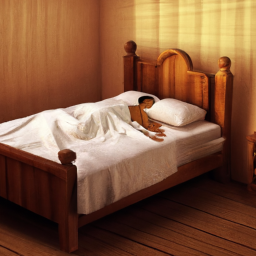As a queer individual, I frequently struggle with thoughts about my sexuality and who I am. Lately, I have been feeling very confused and anxious because of dreams I have about being gay. Initially, I was hesitant to talk about these experiences with anyone, fearing that I was the only one dealing with this inner conflict.
But as I did more research and talked to people in my community, I realized that this is a common experience for many queer individuals. While dreams are often dismissed as meaningless and random, they can actually hold a lot of significance and reveal important insights into our subconscious.
In this article, I’ll be exploring the reasons behind why I might be having gay dreams, looking at both the scientific and personal factors that could be influencing my experiences. Whether you’re a queer person struggling with similar dreams, or someone looking to better understand the complexities of sexuality and identity, I hope this article will provide valuable insights and support.
Key Takeaways
- Dreams can serve as a means for our subconscious to process and make sense of our waking experiences, including exploring aspects of our identity and desires related to sexual orientation.
- Exploring hidden desires can be scary and confusing, but it can also be liberating and empowering. It’s okay to have thoughts and feelings that may not align with our current understanding of ourselves.
- Understanding societal messages about sexuality is important in accepting one’s own identity. Society often sends messages about what is considered ‘normal’ or ‘acceptable’ when it comes to sexuality.
- Educating oneself about different sexual orientations and gender identities can help with acceptance. Surrounding oneself with supportive and accepting individuals is important. Open communication can reduce feelings of isolation and loneliness.
Understanding the Role of Dreams in Our Lives
Dreams can often serve as a means for our subconscious to process and make sense of our waking experiences, which may include exploring aspects of our identity and desires such as those related to sexual orientation.
As a gay person, it’s not uncommon for me to have dreams that involve same-sex partners or experiences. While these dreams may be confusing or uncomfortable at times, they can also be a way for me to explore and accept my own sexuality in a safe and private space.
It’s important to remember that dreams are not always literal representations of our desires or experiences. They can be influenced by a variety of factors, including our emotions, memories, and even our physical surroundings.
That’s why understanding the science of dreaming can be helpful in interpreting the messages that our dreams may be trying to communicate to us.
The Science of Dreaming
During REM sleep, my brain experiences heightened activity and my body becomes temporarily paralyzed.
Studies show that on average, people have 3 to 6 dreams per night.
The science of dreaming has been a subject of fascination for many years, and scientists have made significant progress in understanding how and why we dream.
One theory suggests that dreaming helps the brain process and consolidate memories, while another proposes that it allows us to work through unresolved emotions and conflicts.
Regardless of the exact reason, it’s clear that dreaming plays an important role in our mental and emotional health.
That being said, there are also psychological factors that can influence the content of our dreams, which will be explored in the subsequent section.
Psychological Factors
So, when it comes to exploring the psychological factors that may be influencing our dreams, there are a few key points to consider.
Firstly, our dreams can often be a way for us to reconcile inner conflicts that we may not be fully aware of when we’re awake.
Secondly, they can also offer a space for us to explore hidden desires or thoughts that we may not feel comfortable acknowledging in our waking lives.
Finally, dreams can also be a tool for coping with trauma or difficult experiences, allowing us to process and work through emotions that we may struggle to deal with during the day.
Reconciliation of Inner Conflicts
You may be experiencing inner conflicts that need to be reconciled if you’re having gay dreams. Sometimes, our subconscious mind tries to communicate with us through dreams. These dreams may reveal the parts of ourselves that we haven’t fully accepted or embraced.
It’s possible that you’re struggling with your sexual identity, and the dreams are a manifestation of those struggles. Perhaps you’ve been conditioned by society to believe that being gay is wrong, and this belief is causing internal conflict.
It’s important to address these inner conflicts and work towards reconciling them. This process can involve seeking therapy or counseling, talking to trusted friends or family members, or engaging in self-reflection and exploration. By doing so, you may find that your dreams become less frequent or less intense.
In the subsequent section about exploring hidden desires, we’ll discuss some ways to further delve into these inner conflicts and understand your true desires.
Exploration of Hidden Desires
Ahoy! Let’s set sail on the exciting journey of uncovering our secret desires.
It’s not uncommon to have dreams that are outside of our typical sexual preferences, and it’s important to explore these feelings in a safe and healthy way. Sometimes our subconscious minds reveal hidden desires that we may not have been aware of, and it’s important to acknowledge and accept these feelings without judgement.
Exploring our hidden desires can be a scary and confusing process, but it can also be liberating and empowering. It’s important to remember that sexuality is fluid, and it’s okay to have thoughts and feelings that may not align with our current understanding of ourselves.
By embracing these desires and exploring them in a safe and consensual way, we can gain a deeper understanding of ourselves and our sexuality. And with that, we can move forward in our journey towards self-discovery and acceptance.
Coping with trauma is another layer to this journey, and it’s important to approach it with care and compassion.
Coping with Trauma
As I explored the idea of hidden desires, I couldn’t help but also consider the possibility that my gay dreams were a result of trauma.
It’s no secret that traumatic experiences can have a lasting impact on our mental and emotional well-being. As someone who’s experienced their fair share of trauma, I couldn’t help but wonder if my dreams were a way for my mind to process and cope with the difficult experiences I’ve had.
It’s not uncommon for trauma survivors to experience vivid or distressing dreams. In fact, it’s often a symptom of conditions like PTSD.
As I began to delve deeper into the possibility that my gay dreams were related to trauma, I realized that it was important for me to seek the help and guidance of a mental health professional. Through therapy, I hope to better understand the root of my dreams and find healthy ways to cope with any trauma that may be impacting my life.
As I continue on this journey of self-discovery, I’m reminded of the importance of exploring our personal experiences and seeking help when we need it.
Personal Experiences
Although I’ve never acted on my same-sex attraction, my recurring gay dreams have left me questioning my sexuality and personal identity.
Growing up, I always felt like something was different about me. I didn’t quite fit in with the other boys and had a difficult time relating to them. As I got older, I began to realize that I was attracted to men, but I never acted on those feelings.
However, my dreams often feature men and I wake up feeling confused and uncertain about myself.
It’s been a difficult journey trying to understand my sexuality and where I fit in. I’ve struggled with feelings of shame and guilt, but I know that I’m not alone. Many others have gone through similar experiences and have come out stronger on the other side.
I’m looking forward to exploring the cultural and social influences that may be impacting my dreams and my personal identity.
Cultural and Social Influences
I personally believe that our cultural and social environment greatly affects our perception of sexuality.
Family and peer relationships, societal messages about sexuality, and religious and moral beliefs all play a role in shaping our understanding of what’s considered ‘normal’ or ‘acceptable’ when it comes to sexual orientation.
These factors can greatly influence our thoughts, feelings, and behaviors, including our dreams and fantasies.
The Impact of Family and Peer Relationships
Peer relationships can have a significant impact on one’s sexual orientation. Research shows that LGBTQ+ individuals who have close friendships with other LGBTQ+ individuals are more likely to come out and embrace their identity.
In my personal experience, my peers have played a large role in shaping my understanding of my own sexuality. Growing up, I didn’t have any close friends who identified as LGBTQ+. It wasn’t until I started college and met people who were open about their sexual orientation that I began to question my own feelings and desires.
Having friends who were openly gay or bisexual made me feel more comfortable exploring my own sexuality. I felt like I had a safe space to ask questions and express my feelings without fear of judgment. However, I also experienced some negative peer pressure from people who didn’t understand or accept LGBTQ+ identities. This made me feel ashamed and confused about my own desires.
Despite these challenges, I believe that my peer relationships have ultimately helped me to better understand and embrace my sexuality. As I continue to explore my sexuality, I am also aware of the societal messages about sexuality that can influence my thoughts and feelings. These messages can come from media, religion, family, and other sources. However, I believe that understanding the impact of my peer relationships has given me a strong foundation to resist negative messages and embrace my own identity.
Societal Messages about Sexuality
You may have noticed that society often sends messages about what is considered ‘normal’ or ‘acceptable’ when it comes to sexuality, but it’s important to remember that these messages are not always accurate or inclusive. For example, growing up, I was taught that being heterosexual was the only acceptable option. It wasn’t until I started having gay dreams that I began to question these societal messages. The media, movies, and advertisements all seemed to depict heterosexual relationships as the norm, which made me feel like I was an outlier for having these dreams. However, as I started to explore my own sexuality, I realized that there is no one-size-fits-all when it comes to attraction and desire.
To further illustrate this point, consider the following table:
| Society tells me… | But the reality is… | How this makes me feel… |
|---|---|---|
| Only heterosexual relationships are valid | Attraction is fluid and personal | Confused and ashamed |
| Being gay is a choice | Sexual orientation is innate | Invalidated and misunderstood |
| Gender roles should be strictly defined | Gender expression is diverse | Limited and boxed in |
| Sex is shameful and taboo | Sex can be healthy and positive | Guilty and embarrassed |
| Monogamy is the only way | Relationship styles vary for each individual | Pressure to conform |
As you can see, societal messages about sexuality can be harmful and create unnecessary shame and confusion. It’s important to recognize that everyone’s experiences and desires are unique and valid, regardless of what society may say. This realization can be liberating and empowering, allowing individuals to embrace their true selves without fear of judgment or rejection.
Moving on to religious and moral beliefs, it’s important to consider how these factors can also impact one’s understanding of their sexuality.
Religious and Moral Beliefs
Religious and moral beliefs can greatly impact how we perceive our own sexuality. Growing up in a religious household, I was taught that homosexuality was a sin and that it went against the natural order of things. These messages were reinforced by the wider community, which led to a deep sense of shame and confusion whenever I had gay dreams or thoughts.
I felt like I was doing something wrong, and the fear of being judged or rejected kept me from exploring these feelings further. It wasn’t until I started questioning these beliefs and seeking out resources that were accepting of different sexualities that I began to feel more comfortable with myself.
It took time, but eventually, I was able to accept that my sexuality was a natural part of who I am. Letting go of these deeply ingrained beliefs and embracing my true self was a powerful experience, and it allowed me to live a more authentic and fulfilling life.
Accepting Your Sexual Identity
Sometimes it can be difficult to fully accept and embrace your sexual identity, especially if it differs from societal norms or expectations. However, it’s important to remember that your sexual identity is a natural and beautiful part of who you are.
It’s okay to feel uncertain or confused about your sexuality, and it’s important to give yourself time and space to explore and understand your feelings. One way to begin accepting your sexual identity is to educate yourself about different sexual orientations and gender identities. This can help you feel less alone and more confident in your own identity.
It’s also important to surround yourself with supportive and accepting individuals who will love and affirm you for who you are. Remember, accepting your sexual identity is a journey, and it’s okay to take it at your own pace.
In the subsequent section, we’ll discuss the importance of communicating with partners and loved ones about your sexual identity and how to do so in a healthy and respectful way.
Communicating with Partners and Loved Ones
When it comes to communicating with partners and loved ones, I believe that open communication is key. It allows for honesty and understanding in the relationship, which can ultimately strengthen it.
However, navigating changes in relationships can be difficult, and it’s important to respect boundaries and consent throughout these conversations.
The Benefits of Open Communication
If you’re feeling confused or uncertain about your gay dreams, it can be helpful to talk openly with someone you trust, like a friend or therapist, as this can provide a safe space for you to explore and understand your feelings.
Open communication has many benefits, including reducing feelings of isolation and loneliness, building trust and intimacy in relationships, encouraging personal growth and self-awareness, and promoting a sense of acceptance and understanding from others.
By sharing your thoughts and feelings with someone you trust, you may find that you are not alone in your experiences and that others have had similar dreams or feelings. This can help you feel less isolated and more connected to those around you.
Additionally, open communication can lead to stronger, more intimate relationships, as it allows you to share your true self with others and build trust over time.
Moving forward, navigating changes in relationships can be challenging, but with open communication and a willingness to be vulnerable, it is possible to build deeper connections with those around you.
Navigating Changes in Relationships
Navigating changes in relationships can be challenging, but it’s important to approach these changes with open communication and a willingness to be vulnerable.
For example, when I realized that I was having gay dreams, it was a difficult realization for me to come to terms with. I was in a committed heterosexual relationship and didn’t know how to talk to my partner about my feelings. However, I knew that I needed to be honest with them in order to maintain our relationship.
Together, we worked to navigate this change in our dynamic and find ways to support each other. It wasn’t easy, but by being open about our feelings and desires, we were able to come to a better understanding of ourselves and each other.
This process taught me the importance of respecting boundaries and consent in any relationship, and it’s something that I continue to work on to this day.
Respecting Boundaries and Consent
Respecting boundaries and obtaining consent is crucial in any type of relationship, and it’s important to create a safe and comfortable environment for both parties involved. It’s important to remember that every person has different boundaries and comfort levels, and it’s essential to respect them. When we violate someone’s boundaries or engage in non-consensual behavior, it can cause harm and damage the relationship.
To ensure that we are respecting boundaries and obtaining consent, we can take the following steps:
- Listen actively and communicate openly with our partner(s).
- Check in regularly to make sure everyone is comfortable and consenting.
- Respect any boundaries that are established, even if they may differ from our expectations.
By taking these steps, we can create a healthy and respectful relationship that prioritizes the well-being of all parties involved.
With this foundation, we can then move towards finding community and connection in a way that feels safe and fulfilling.
Finding Community and Connection
Connecting with a supportive community can be a crucial step in feeling comfortable with my gay dreams. It can be difficult to navigate these feelings on my own, and having a group of people who understand and accept me can make all the difference.
Through connecting with others who share similar experiences, I can gain a sense of belonging and validation. Being part of a community also allows me to learn from others who have gone through similar experiences. I can hear their stories, share my own, and gain insight into how to navigate my feelings and desires. This can help me feel more confident and empowered in exploring my sexuality.
Next, I’ll discuss how exploring my sexual desires and preferences can be another important step in understanding my gay dreams.
Exploring Your Sexual Desires and Preferences
Discovering what you’re truly attracted to can be an exciting and liberating journey towards understanding your sexuality. It’s important to explore your sexual desires and preferences in a safe and consensual way.
This may involve experimenting with different forms of sexual expression and exploring fantasies that you may have previously suppressed or ignored. It’s also important to remember that sexuality is fluid and can change over time.
What you may be attracted to now may not be what you are attracted to in the future, and that’s okay. Embracing your authentic self means accepting and celebrating all aspects of your sexuality, including those that may not fit societal norms or expectations.
Embracing Your Authentic Self
Embracing your authentic self means accepting and celebrating all aspects of who you are, including your unique quirks and personality traits. It means not hiding or suppressing parts of yourself because you think they don’t fit society’s standards.
For me, this meant accepting my attraction to both men and women, and not feeling ashamed or confused when I had dreams or thoughts about the same sex. Embracing my authentic self has allowed me to feel more comfortable in my own skin and has given me a greater sense of confidence.
It has also allowed me to form deeper and more meaningful connections with others who accept and celebrate me for who I am. So, if you’re struggling with accepting a part of yourself that doesn’t fit the norm, remember that embracing your authenticity can lead to a happier and more fulfilling life.
- Embrace your quirks and unique traits.
- Don’t suppress parts of yourself to fit society’s standards.
- Form deeper connections with others who accept and celebrate you for who you are.
Frequently Asked Questions
Can having gay dreams make me gay?
No, having gay dreams cannot make me gay. Dreams do not reflect one’s sexual orientation, and it is important to remember that sexual orientation is not a choice but a natural aspect of one’s identity.
Is it normal to have gay dreams if I identify as straight?
It’s completely normal to have dreams that don’t align with our waking identity. Our subconscious mind can create all sorts of scenarios, including ones that challenge our beliefs. As long as we are comfortable with our sexual orientation, there’s no need to worry.
How do I stop having gay dreams?
I can’t control my dreams, but it’s important to remember that they don’t define my sexuality. Instead of trying to stop them, I’ll focus on accepting and embracing my true self.
Can my religion affect my experience of having gay dreams?
My religion plays a big role in how I perceive my gay dreams. Some faiths view same-sex attraction as a sin, causing shame and anxiety. Others embrace diversity and teach acceptance.
Are there any medications or supplements that can influence the content of my dreams?
Yes, medications and supplements can influence the content of dreams. For example, antidepressants and sleep aids can cause vivid dreams, while certain herbs like valerian root may promote peaceful dreams.
Conclusion
In conclusion, having gay dreams can be a confusing and sometimes scary experience. However, we can begin to make sense of these dreams and use them as a tool for self-discovery by understanding the role of dreams in our lives and the various factors that can influence them.
Our dreams can offer valuable insights and guidance, whether it’s exploring our sexual desires and preferences, embracing our authentic selves, or finding community and connection with others.
So don’t be afraid to delve deeper into your dreams and engage with them on a more meaningful level. As the old saying goes, "the proof of the pudding is in the eating."By embracing your dreams and all that they have to offer, you just might find yourself on a path towards greater happiness, fulfillment, and self-discovery.









